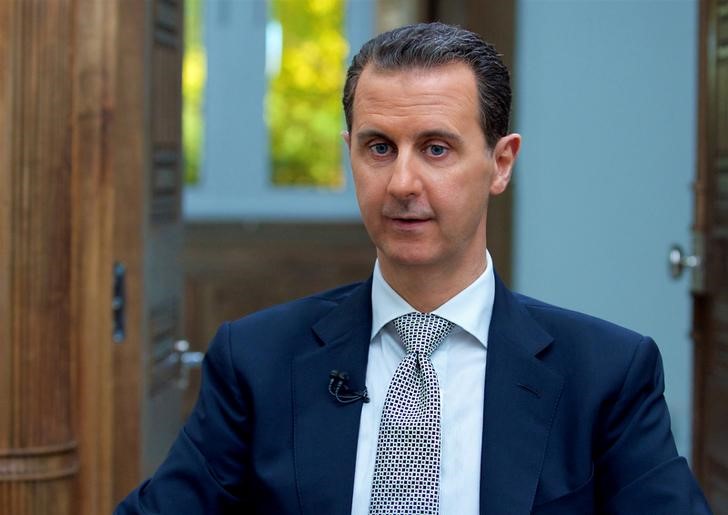
By Katya Golubkova and Tom Perry
MOSCOW/BEIRUT (Reuters) – Russian President Vladimir Putin hosted Syrian leader Bashar al-Assad late on Monday for three hours of talks to lay the groundwork for a new push by Moscow to end Syria’s conflict now that Islamic State’s territorial caliphate is overrun.
Russia is actively trying to broker an international consensus around a peace deal for Syria, over two years after Moscow began a military intervention that turned the tide of the conflict in Assad’s favor.
Putin said he would follow up his meeting with Assad by talking in the next 48 hours to international leaders with influence over the conflict, among them U.S. President Donald Trump, the Saudi king, and the leaders of Iran and Turkey.
Previous attempts to end Syria’s six years of war have foundered because of bitter disagreements among players in the conflict, both inside and outside Syria, especially whether Assad himself should stay in power.
After the talks in Russia — Assad’s first publicly-declared travel outside Syria since a trip to Moscow in October, 2015 — a Kremlin spokesman declined to say if Assad’s own future had come up in the discussions, saying only that was up to the Syrian people.
In a sign that international attempts may be underway to bridge the differences between rival sides in the conflict, leading Syrian opposition figures, including former prime minister Riyad Hijab, resigned.
Hijab headed the opposition High Negotiations Committee, formed with Saudi backing, and had insisted on Assad’s removal from power at the start of a political transition.
Russian Foreign Minister Sergei Lavrov, speaking in Moscow, said the resignations would make the opposition more reasonable and realistic.
On Wednesday, Turkish President Tayyip Erdogan and Iranian President Hassan Rouhani — whose countries back opposing sides in the Syria conflict — will travel to Russia for a three-way meeting with Putin aimed at advancing the Syrian peace process.
SECRET VISIT
Assad’s visit to Russia was brief and closely-guarded. He flew in on Monday evening, held talks, and flew out four hours after landing, according to the Kremlin. Officials did not release word of the meeting until Tuesday morning.
Sitting either side of a small coffee table in a conference room at Putin’s residence in Sochi, southern Russia, Putin told Assad it was time to pivot from a focus on military operations to a search for a peaceful solution.
Syrian government forces and their allies at the weekend took control of Albu Kamal, the last major Syrian town held by Islamic State.
“We still have a long way to go before we achieve a complete victory over terrorists. But as far as our joint work in fighting terrorism on the territory of Syria is concerned, this military operation is indeed wrapping up,” Putin told Assad, in comments broadcast by Russian television.
“Now the most important thing, of course, is to move on to the political questions, and I note with satisfaction your readiness to work with all those who want peace and a solution (to the conflict),” Putin said.
Russian Defence Minister Sergei Shoigu, dressed in an olive-colored uniform, looked on as Putin and Assad spoke.
ASSAD’S FUTURE
Wearing a dark suit and sitting across a small coffee table from Putin, Assad told the Russian leader: “At this stage, especially after we achieved victory over terrorists, it is in our interests to move forward with the political process.
“And we believe that the situation we now have on the ground and in the political sense permits us to expect progress in the political process. We count on the support of Russia to ensure the non-interference of outside players in the political process,” he said through an interpreter.
“We don’t want to look backwards. We welcome all those who truly want to see a political solution. We are ready to have a dialogue with them,” said Assad.
Putin and Assad last met in Moscow on Oct. 20, 2015, a few weeks after Moscow launched its military operation in Syria, which has beaten back anti-Assad rebels and propped up struggling government forces.
Underscoring the importance of the Russian military to Assad, Putin presented the Syrian leader to top military commanders assembled at his Sochi residence.
“On behalf of the entire Syrian people, I express my gratitude for what you have done,” Assad told them. “We will not forget it.”
Assad’s opponents, and Western governments, have accused Russia of killing significant numbers of Syrian civilians with its air strikes, allegations Moscow denies.
Some people familiar with the Kremlin’s thinking say that, to reach a peace deal, Russia would not insist on Assad staying in power — as long as the institutions of the Syrian state remained intact.
But while Russia is not wedded to Assad, Iran is committed to him. Iranian forces and the Iran-backed Hezbollah militia have played a big role in the fighting on the ground, supporting Assad’s forces.
Hezbollah leader Sayyed Hassan Nasrallah thanked and praised Shi’ite militias including Afghans and Iraqis for their role in the Syria war in a speech on Monday night.
He said the head of the Iranian Revolutionary Guards Qods Force, Major General Qassem Soleimani, had led the battle for Albu Kamal from the frontlines.
(Additional reporting by; Writing by Christian Lowe; Editing by Catherine Evans and William Maclean)









